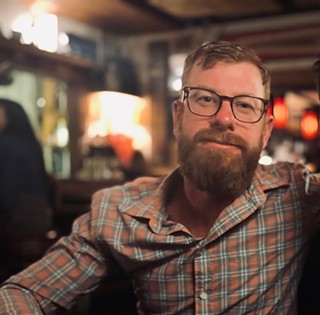While whole anthologies could detail the path of carnage, a few incidents help to understand the atmosphere inside the club and in the city.
On March 6, 1971, bikers gathered for a custom cycle show at the Polish Women's Hall in Cleveland. The Hells Angels knew, according to media reports at the time and law enforcement sources, that the Breed, a rival gang, had planned on attacking them at the show. The HA hid weapons inside the hall and made sure that the cavalry—members from other chapters across the country—would be outside and waiting without their colors on when the Breed arrived. Once they entered, they were faced with armed Hells Angels in the front—"Freddie [Radatz, then president] made sure we didn't bring guns with us," Crouch wrote later in life. "We went there and stood up as Men."—and fellow Angels behind them.
85 were arrested. 31 members of the Breed were indicted; 14 from the Hells Angels. Five were dead, 21 were wounded.
Crouch was among them, and though indicted for first-degree murder, he received only two years probation and time served. (Crouch would later tell a friend in an email, and include in his writings, that Cuyahoga County Judge Frank Gorman was bribed.)
"That changed everything," Crouch would write. "New Roll Bones Rule [slang for killing someone to earn full membership to the club], the TCB fund [Taking Care of Business Fund, which he said was used to fund wars with rival gangs] and the focus became how to kill Breed. Biker magazines on the clubhouse coffee table were replaced with how to build bombs and booby traps. And selling dope to finance the war became big."
Crouch was among the worst of the worst. Over the next decade, he would be investigated for rape, narcotics, assault to kill, assaulting a police officer, and about 12 other felonies.
The ATF file notes the severe "loss of human life" attributed to the Hells Angels during that time. "Investigations reveal the Angels to be responsible for at least 20 separate murders, several who were innocent victims having no connection to HAMC at all."
The war against the Outlaws, stockpiled with garages of ammo and guns and bombs, funded by copious drug sales, escalated in the mid 1970s. Bombings increased, and innocents died in very public fashion.
On Jan. 7, 1975, a suitcase bomb was left at the door of a Cleveland home. Brought inside by 26-year-old Burdell Offitt, who was visiting the home, the bomb exploded seconds later, killing him, 21-year-old mother Maryanne Sigley, and her 2-year-old son Michael. Three others were injured.
Years later, the Hells Angels responsible would say they thought an Outlaw lived at the house. That was not the case.
It wasn't just rival gang members and innocents who were being killed. In 1975, club treasurer James "Beetle" Bailey was shot and killed in Iowa on his way to a Hells Angel club run in South Dakota. He was riding with two fellow Angels at the time—Richard Vesey, who was hit in the arm, and "Chip." Chip was murdered during Beetle's funeral. Angel members in Cleveland told the club he was killed because they found a number for an Outlaw, a rival gang, in his billfold.
Crouch wrote that Bailey had receipts with him that he believed would prove members of financial misconduct. Crouch said Beetle had brought the evidence to his fellow Cleveland members, which led to a heated church meeting and a feeling later, all but admitted by Vesey, that Angel members and TCB officers had killed Beetle to prevent him from handing over the receipts.
"All who came to the clubhouse armed and ready to do whatever to find out who and why those who killed Chip and thought they had a right to kill a member with the sanction of the whole membership," Crouch wrote in the 1988 letter. "But it ended when the President stood and gave a long speech about how we should forget Chip since he was an outsider [Chip was a North Carolina patch] and do all we could to draw the Cleveland chapter to what it was supposed to be."
Crouch wasn't sure what that was anymore.
***
In November 1981, Clarence Crouch contacted the ATF. He would turn state's witness against the Hells Angels.
Why he made that decision may never be known, but from correspondence later in life, anecdotes from family members, testimony and his sprawling, rambling writings he frequently tried to publish, Crouch had a genuine change of heart. He would turn snitch, putting a target on his head. This is not what he had signed up for.










